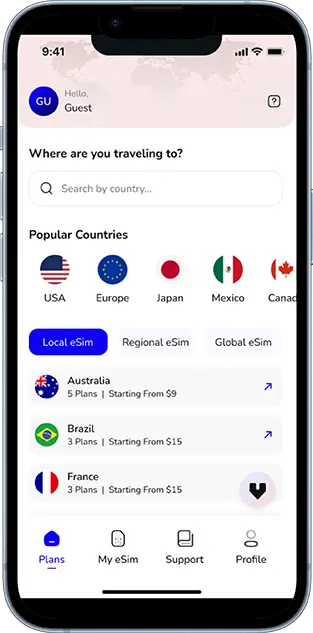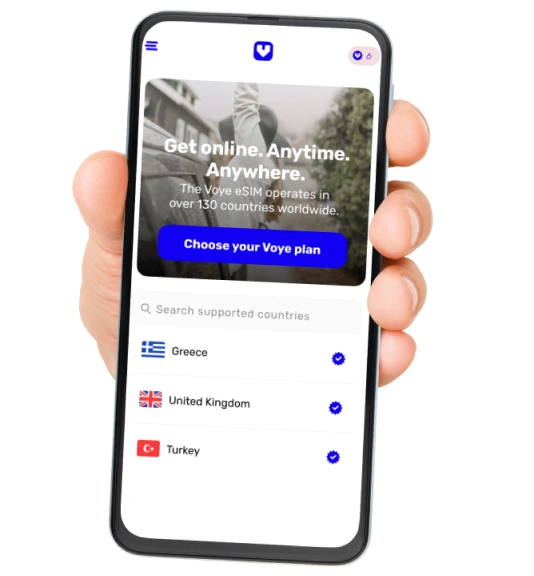Note that iPhone devices from Mainland China aren’t eSIM compatible. Also iPhone devices from Hong Kong and Macao aren’t compatible (except for iPhone 13 Mini, iPhone 12 Mini, iPhone SE 2020 and iPhone XS)
Traveling abroad is an exciting experience filled with new sights, cultures, and adventures. However, even the most carefully planned trips can be interrupted by unexpected emergencies. Whether it’s a lost passport, sudden illness, natural disaster, or political unrest, being prepared can make all the difference.
In this comprehensive guide, you’ll learn exactly what to do in an emergency while traveling abroad. We’ll also show you how using an eSIM for travel ensures you stay connected when it matters most.
Types of Emergencies Travelers May Face
a. Medical Emergencies
From food poisoning to serious injuries, medical issues are among the most common emergencies abroad. Knowing the local healthcare system and having insurance is vital.
b. Lost or Stolen Passport
Losing your passport can feel catastrophic. However, embassies and consulates can issue emergency travel documents quickly—if you act fast.
c. Natural Disasters
Earthquakes, floods, wildfires, and hurricanes can disrupt transportation, accommodation, and safety. Always check seasonal weather risks before traveling.
d. Political Unrest or Civil Disturbance
Protests or coups can escalate quickly. Knowing your country’s embassy location and having emergency alerts activated helps you avoid danger zones.
e. Theft or Robbery
Petty theft is common in tourist-heavy areas. Always back up your documents digitally and carry limited cash.
f. Transportation Strikes or Cancellations
From airline worker strikes to public transport shutdowns, this can leave you stranded. Emergency planning keeps your trip on track.
Immediate Actions to Take in Any Emergency
a. Stay Calm and Assess the Situation
Panic leads to poor decision-making. Take a deep breath, evaluate your surroundings, and ensure you’re safe before taking further steps.
b. Contact Emergency Services
Every country has its own emergency numbers:
- Europe (EU): 112
- USA/Canada: 911
- UK: 999
- Australia: 000
Save local emergency numbers on your phone before arrival.
c. Inform Your Embassy or Consulate
Embassies provide assistance in almost all emergencies, including evacuations, lost passports, and legal trouble. Register your travel with your embassy if possible.
d. Use eSIM for Instant Connectivity
If local SIMs fail or stores are closed, an eSIM for international travel lets you switch carriers instantly and stay connected, no matter where you are.
Your Journey, Our eSIM
Stay online abroad with instant activation.
How to Handle Specific Emergencies
a. If You Lose Your Passport
- Report the loss to the local police.
- Visit your nearest embassy or consulate.
- Provide proof of identity and citizenship (backup digital copies help).
- Request an emergency travel document or replacement passport.
Tip: Always keep passport copies in cloud storage or email.
b. In Case of a Medical Emergency
- Use your travel insurance contact to find recommended hospitals.
- Head to the nearest hospital or call emergency medical services.
- Keep medical history and allergies translated in local language if needed.
Pro Tip: Travel with a basic first-aid kit and prescribed medications.
c. If You’re in a Natural Disaster
- Follow local emergency alerts (enabled with data from your travel eSIM).
- Seek shelter and avoid dangerous areas.
- Contact your embassy for evacuation or safe locations.
- Monitor local news and advisories via credible sources.
d. If You’re a Victim of Theft or Robbery
- File a police report immediately.
- Block your bank cards and notify your financial institutions.
- Contact your travel insurer for claims.
- Replace stolen travel documents through your embassy.
e. Detained or Arrested Abroad
- Remain respectful and cooperative.
- Request to contact your embassy.
- Avoid signing anything without an interpreter or legal support.
Travel Insurance: Your Emergency Lifeline
Investing in comprehensive travel insurance gives you access to:
- 24/7 emergency assistance
- Medical evacuation and repatriation
- Trip interruption or cancellation coverage
- Lost baggage protection
Tip: Choose providers that offer coverage for both health and non-health emergencies.
Emergency Contacts You Should Always Have
Before departure, compile and save:
- Local emergency services numbers
- Nearest embassy or consulate
- Travel insurance helpline
- Airline and hotel contact info
- A local contact (e.g., your Airbnb host)
Tech Tips for Staying Connected in a Crisis
a. Use eSIM for Emergency Communication
Whether you’re in Japan, Turkey, or Brazil, eSIMs for travel let you activate data instantly without a physical SIM. You can:
- Contact embassies
- Use Google Maps to find help
- Stay connected via WhatsApp or email
- Access digital insurance documents
b. Offline Maps and Translation Apps
Download offline maps (Google Maps offline) and language apps like Google Translate for navigating areas without internet.
Emergency Preparedness Before You Travel
a. Register with Your Embassy
Many countries offer programs like STEP (USA) or ROCA (India) for travelers to register their trips for safety alerts.
b. Make Digital and Physical Copies of Documents
Scan and save:
- Passport
- Visa
- Travel insurance
- Itinerary
- Vaccination records
c. Set Up Your eSIM in Advance
Install your Voye Global eSIM or preferred eSIM provider before departure so you’re ready the moment you land.
d. Carry a Power Bank and Backup Charger
When your phone is your lifeline, don’t let it die mid-crisis.
FAQs on Emergency Travel Situations
Q: What should I do if I lose all my money or wallet abroad?
Visit your embassy and request assistance. Use services like Western Union or ask family to send funds. Always keep a backup credit card separately.
Q: Can I travel without travel insurance?
Technically yes, but it’s highly discouraged. Emergencies abroad can cost thousands without coverage.
Q: What’s the first thing I should do in a medical emergency?
Call local emergency services and your insurance provider immediately.
Q: How can I access emergency news updates abroad?
Enable news alerts via apps like BBC, Google Alerts, or use Twitter/X hashtags related to the region.
Conclusion: Travel Smart, Stay Safe
Emergencies abroad can feel overwhelming, but with the right preparation, tools, and mindset, you can handle any challenge. From registering with embassies and getting travel insurance to staying connected via eSIM technology, smart travelers prioritize safety as much as sightseeing.
Stay calm, stay informed, and most importantly—stay connected. With solutions like Voye Global eSIM, you’re always just a few taps away from the help you need.
Global Coverage, Local Rates
Experience hassle-free connectivity wherever you go.
Seamless Mobile Data Everywhere
















